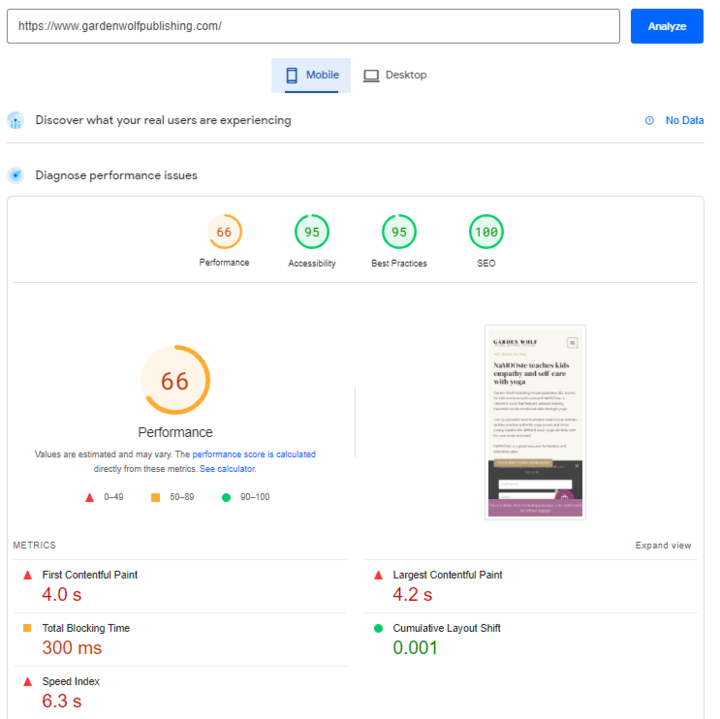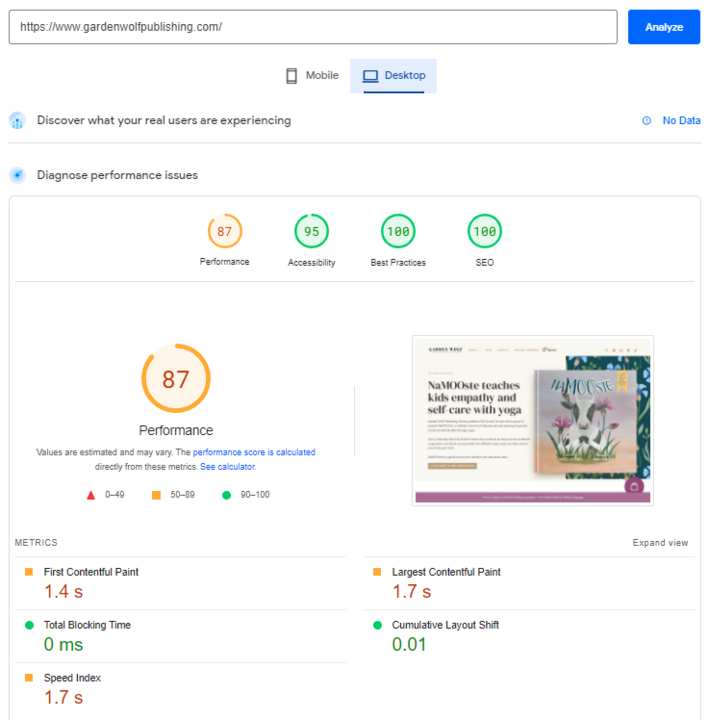Garden Wolf Publishing House is a company that publishes SEL books for kids. They contacted us because the site was working slowly, and this had a negative impact on the user experience. Our developers took a comprehensive approach to solving this problem, let’s see what results were achieved.
This project falls under our WordPress speed optimization services and WordPress mobile optimization, with a focus on Core Web Vitals (LCP, INP, CLS) and Google PageSpeed optimization for search and UX.
What We Started Working With
Before starting any optimization, we test the website. To do this, our WordPress developers use the Google Pagespeed Insights program. The Garden Wolf Publishing House website had the following indicators:


We also reference Lighthouse and GTmetrix to compare lab and field signals like TTFB, FCP, and TBT, especially for mobile performance (see our approach to Google PageSpeed optimization).
As you can see, the performance indicators are generally quite good, but the client wanted the site to work much faster. The problem wasn’t just big pictures and dirty and unused code. Weak hosting played a big role in slowing down the site. Its power was not enough to carry out background optimization processes, so we suggested the client change hosting. After that, our WordPress development team continued to improve the site. Let’s look at what we did.
Code Improvements
The basis of any website is the code. If the syntax does not comply with the WordPress Codex, it is dirty and too long, then the site will work much slower. Our website developers minified CSS and JS as part of optimization. Minification is cleaning the code from extra characters, spaces, and comments. This reduces the number of lines of code and makes it easier for the browser to index pages. As a result, the site opens faster and the user experience improves.
We also target render-blocking resources with critical CSS, defer/async JavaScript, and minify CSS/JS/HTML, add preconnect/preload/dns-prefetch for key origins, and keep plugin hygiene and responsive design & media queries in mind for layout stability.
These steps directly improve Core Web Vitals, especially LCP and INP, by reducing main-thread work and stabilizing paint.
Work With Images
Large or outdated image formats slow pages down. We reduced image sizes, converted assets to WebP, and configured automatic conversion (e.g., via a WebP plugin). We also enabled lazy loading so images render as users scroll. This aligns with our broader mobile optimization for WordPress websites approach, where visual assets are tuned for smaller screens first.
Plugins Installation
Plugins are useful tools that can improve the performance of a website. We installed the following plugins:
- Perfmatters. This plugin allows us to disable unused functionality. Unnecessary features slow down web pages.
- WP Rocket. We use this plugin to set up and enable caching. Thanks to caching, when the user reopens the site, it takes a few seconds to launch the page.
This plugin set helps with page caching, browser caching, and asset control, and pairs well with a Redis object cache for dynamic sites.
About Caching
Properly configured caching makes pages feel instant on repeat visits. We enabled and tuned caching policies (page, browser, and object-level), plus CDN rules, to speed up delivery and reduce server load — core tactics in our WordPress speed optimization services.
Results We Achieved
After optimization, our company always re-checks the website using Google Pagespeed Insights and GTmetrix services. Let’s take a closer look at the performance scores:


As we can see, the performance of the mobile and desktop versions has improved significantly. Timely optimization is a necessity for the smooth operation of the site. If the site is optimized, not only the user experience improves, but also the SEO. If you want to receive a free audit and report on your website, write to us. Our WordPress website developers will identify performance issues, if any, and find a solution.











